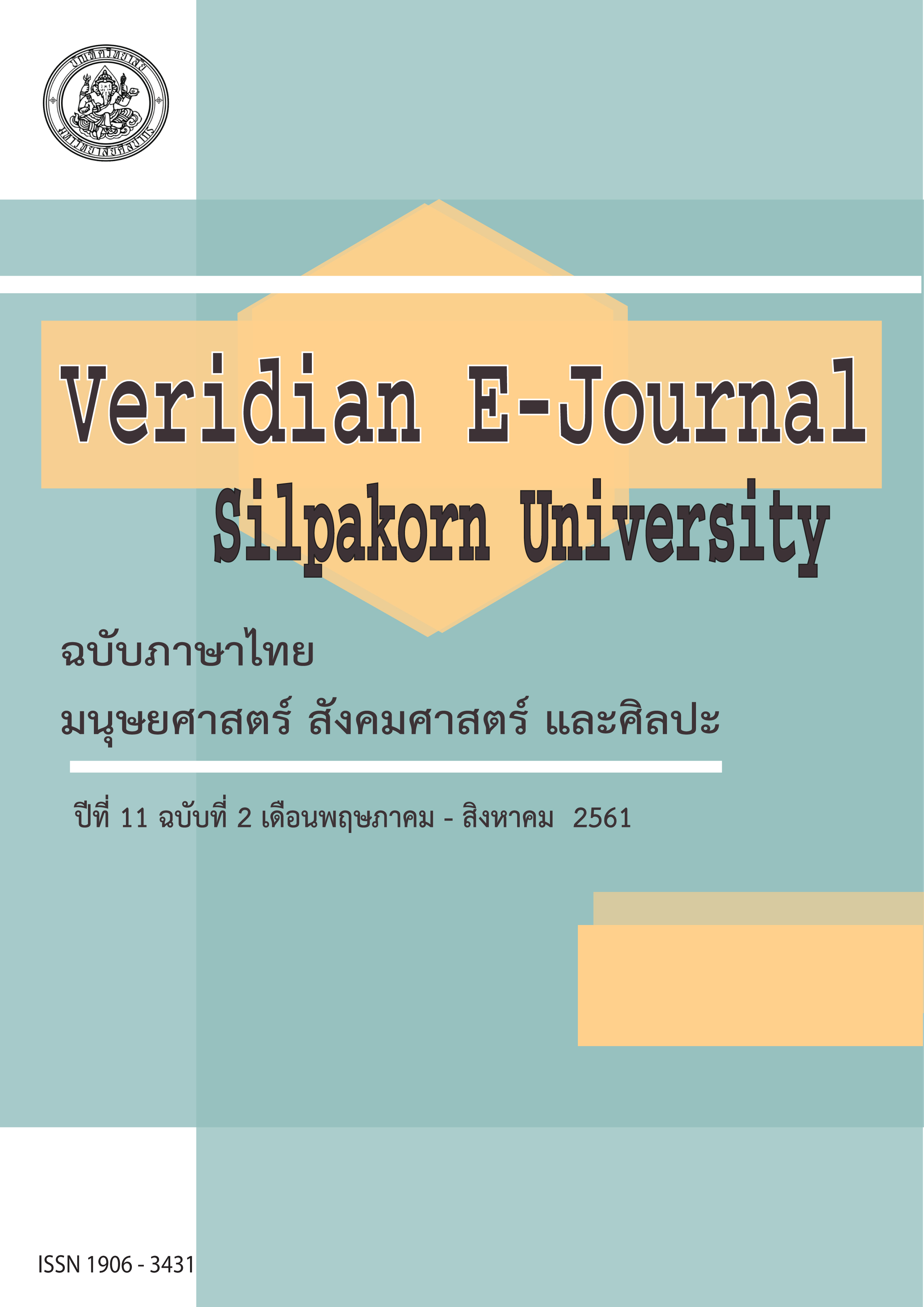แนวปฏิบัติงานหอพักนักเรียนที่สอดคล้องกับหลักปรัชญาของเศรษฐกิจพอเพียง โรงเรียนสองแคววิทยาคม จังหวัดเชียงใหม่ (Guidelines for Applying the Concept of Philosophy of Sufficiency Economy to the Dormitories of Songkwae Wittayakom School, Chiang Mai Province)
Main Article Content
Abstract
การวิจัยครั้งนี้มีวัตถุประสงค์ 1) เพื่อศึกษาปัญหาและปัจจัยที่เอื้อต่อการดำเนินงานหอพักนักเรียนที่สอดคล้องกับหลักปรัชญาของเศรษฐกิจพอเพียง โรงเรียนสองแคววิทยาคม จังหวัดเชียงใหม่ 2) เพื่อศึกษาการดำเนินงานหอพักนักเรียนของโรงเรียนที่มีการปฏิบัติที่ดี 3) เพื่อจัดทำและตรวจสอบแนวปฏิบัติงานหอพักนักเรียนที่สอดคล้องกับหลักปรัชญาของเศรษฐกิจพอเพียง โรงเรียนสองแคววิทยาคม จังหวัดเชียงใหม่ วิธีดำเนินการวิจัย แบ่งเป็น 4 ขั้นตอน ดังนี้ ขั้นตอนที่ 1 การศึกษาปัญหาและปัจจัยที่เอื้อต่อการดำเนินงานหอพักนักเรียน ผู้ให้ข้อมูลประกอบด้วย ผู้บริหารสถานศึกษา ครูและนักเรียน จำนวน 205 คน ขั้นตอนที่ 2 การศึกษาการดำเนินงานหอพักนักเรียนของโรงเรียนที่มีการปฏิบัติที่ดี ผู้ให้ข้อมูลประกอบด้วย ผู้บริหารสถานศึกษา ครูผู้ปฏิบัติงานด้านการดูแลนักเรียนพักนอน จำนวน 9 คน ขั้นตอนที่ 3 การจัดทำแนวปฏิบัติงานหอพักนักเรียน กลุ่มผู้ให้ข้อมูล คือ ผู้บริหารสถานศึกษา หัวหน้างานหอพักนักเรียน คณะกรรมการสถานศึกษาขั้นพื้นฐาน ตัวแทนผู้ปกครองเครือข่าย หัวหน้าประจำหอพักนักเรียน จำนวน 12 คน และขั้นตอนที่ 4 การตรวจสอบแนวปฏิบัติงานหอพักนักเรียน ผู้ให้ข้อมูล คือ ผู้บริหารสถานศึกษาโรงเรียนพักนอน ศึกษานิเทศก์ที่เกี่ยวข้องกับนักเรียนพักนอน จำนวน 3 คน รวมกลุ่มผู้ให้ข้อมูลทั้งสิ้น 229 คน เครื่องมือที่ใช้ ได้แก่ 1) แบบสอบถาม 2) แบบสัมภาษณ์เชิงโครงสร้าง 3) แบบบันทึกการประชุมเชิงปฏิบัติการ (Work Shop) 4) แบบร่างแนวปฏิบัติงานหอพักนักเรียน 5) แบบตรวจสอบแนวปฏิบัติงานหอพักนักเรียน วิเคราะห์ข้อมูลโดยการใช้ ความถี่ (Frequency) ค่าร้อยละ (Percentage) ค่าเฉลี่ย (Mean) ส่วนเบี่ยงเบนมาตรฐาน (SD) และการวิเคราะห์เนื้อหา (Content Analysis)
ผลการวิจัยพบว่า
- ปัญหาการดำเนินงานหอพักนักเรียนที่สอดคล้องกับหลักปรัชญาของเศรษฐกิจพอเพียง โรงเรียน สองแคววิทยาคม จังหวัดเชียงใหม่ แยกออกเป็น 1) ตามทัศนะของผู้ดำเนินงาน โดยรวมอยู่ในระดับปานกลาง และ 2) ตามทัศนะของนักเรียน โดยรวมอยู่ในระดับปานกลาง ในส่วนของปัจจัยที่เอื้อต่อการดำเนินงานหอพักนักเรียนสอดคล้องกับหลักปรัชญาของเศรษฐกิจพอเพียง แยกออกเป็น 1) ตามทัศนะของ ผู้ดำเนินงาน โดยรวมอยู่ในระดับมาก และ2) ตามทัศนะของนักเรียน โดยรวมอยู่ในระดับปานกลาง
- การดำเนินงานหอพักนักเรียนของโรงเรียนที่มีการปฏิบัติดี ใช้หลักปรัชญาของเศรษฐกิจพอเพียงในการดำเนินงานทั้ง 7 งาน พบว่า ทั้งผู้บริหารสถานศึกษา ครู บุคลากรทางการศึกษา และนักเรียนพักนอนทุกคนมีความตระหนัก เข้าใจในการเรียนรู้ มีการปฏิบัติงาน และการใช้ชีวิตแบบเศรษฐกิจพอเพียง
- แนวปฏิบัติงานหอพักนักเรียนที่สอดคล้องกับหลักปรัชญาของเศรษฐกิจพอเพียง โรงเรียนสองแคววิทยาคม จังหวัดเชียงใหม่ ที่จัดทำขึ้นมีองค์ประกอบแยกเป็นงาน 7 งาน โดยแต่ละงาน ประกอบด้วย 1) บทบาทและหน้าที่รับผิดชอบ 2) แนวปฏิบัติ คือ ขั้นตอนการเตรียมการ ขั้นตอนการดำเนินการ ขั้นตอนการประเมินผล 3) เอกสารแบบฟอร์ม และ4) เงื่อนไขความสำเร็จ ผลการตรวจสอบด้านความเหมาะสม และความเป็นไปได้ของแนวปฏิบัติงานหอพักนักเรียนที่สอดคล้องกับหลักปรัชญาของเศรษฐกิจพอเพียง โรงเรียนสองแคววิทยาคม จังหวัดเชียงใหม่ พบว่า ทุกประเด็นโดยรวมอยู่ในระดับมากที่สุด ซึ่งสูงกว่าเกณฑ์ที่กำหนดไว้
This research has three objectives: 1) To study problems affecting to and factors supporting dormitory operations to confirm to the philosophy of sufficiency economy, Songkwae Wittayakom School, Chiang Mai Province, 2) To study school’s dormitory operations incorporating good practices, and 3) To develop and evaluate dormitory operation guidelines by integrating the philosophy of sufficiency economy for Songkwae Wittayakom School, Chiang Mai Province. A research methodology comprised of 4 steps. The first step was to understand what problems affecting to and factors supporting operations of dormitory to be in accordance with the sufficiency economy philosophy. In this phase, a sample of 205 participants in total which consisted of 35 administrators, teachers and education personnel, and 170 boarders. A research instrument was a questionnaire, and collected data was then analyzed in a form of frequency and percentage. The second step was studying school’s dormitory operations incorporating good practices by looking into schools successfully implementing good practices for taking care of boarders and incorporating the sufficiency economy philosophy. Informants of this phase were 9 administrators, head teachers of student affairs and performing teachers. A research instrument was a structured interview questionnaire, and induction was applied for analysis. The next step was development of dormitory operation guidelines which is in line with the philosophy of sufficiency economy for Songkwae Wittayakom School, Chiang Mai Province. A data source included a group of 12 parties including administrators, head of dormitory operation, basic educational institution committees, representative parents and head of dormitory. A conference was held with conference records and draft of dormitory operation guidelines and as research instruments. Last but not least, the fourth step was to review the dormitory operation guidelines under the philosophy of sufficiency economy. In this phase, three experts were asked to evaluate the guidelines through a dormitory operation guidelines evaluation form, and data was then analyzed by each question in a form of average ,standard deviation and content analysis.
Findings from this study were:
- Problems about dormitory operations incorporating the philosophy of sufficiency economy of Songkwae Wittayakom School, Chiang Mai Province were in general rated at a medium level from the viewpoint of operators and at a medium level from the viewpoint of students, while factors contributing to operations for dormitory that conform to the sufficiency economy philosophy were in general at a high level from operators’ point of view and at a medium level from students’ point of view.
- School’s dormitory operations incorporating good practices applied the sufficiency economy philosophy in all of seven components. All administrators, teachers and education personnel, and boarders had to understand as well as to learn how to work and live with the sufficiency economy in mind.
3. Dormitory operation guidelines under the sufficiency economy philosophy consisted of the seven components as follows: 1) roles and responsibilities, 2) operation guidelines including preparation, operation, implementation and evaluation, 3) document forms and 4) Key success factors. an evaluation of every research question about dormitory operation guidelines in consistent with the sufficiency economy philosophy was in general rated at a highest level, which was higher than the defined criteria.

